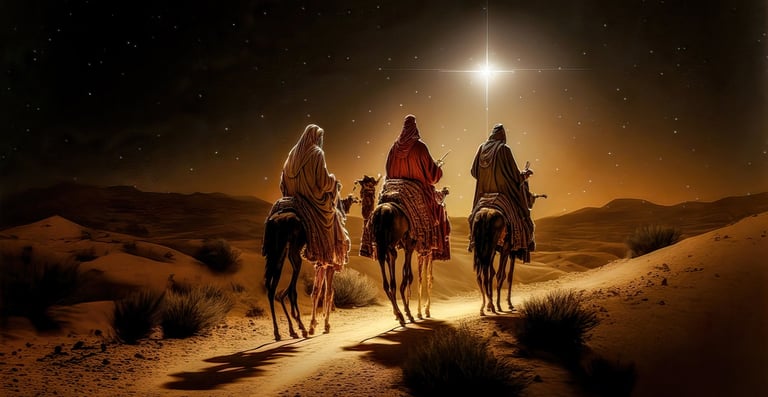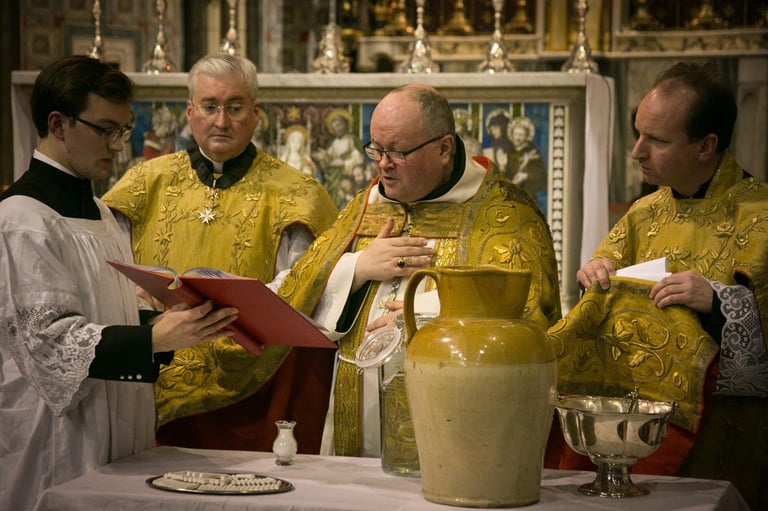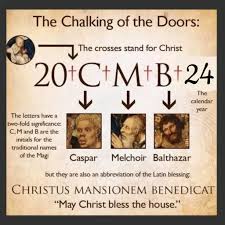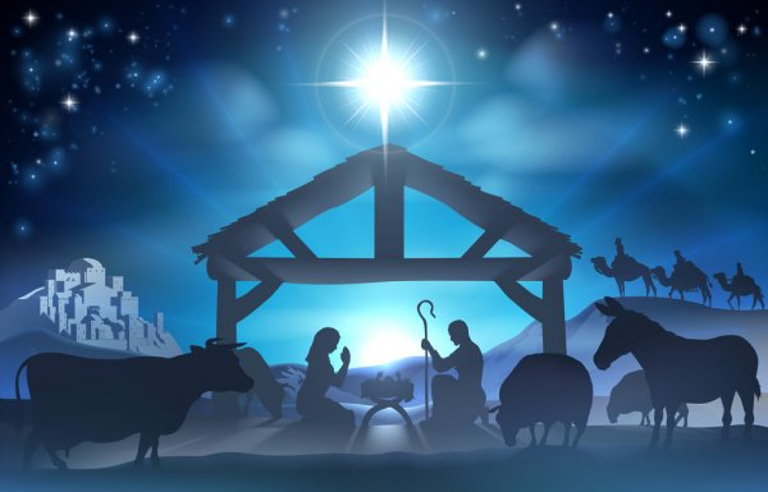What Is Epiphany? Understanding Its Meaning and Importance
Discover the significance of Epiphany, or Three Kings' Day, celebrated on January 6th. Explore its history and traditions today!
Grace Callahan
12/26/202411 min read
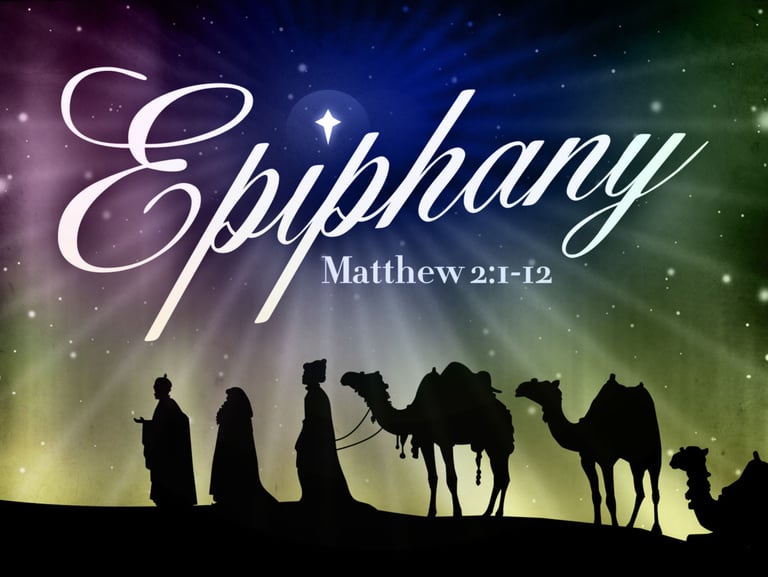

Introduction
Epiphany, or Three Kings' Day, is a deeply meaningful Christian celebration held on January 6th. This day marks the end of the Christmas season and highlights the revelation of Christ to the world. With a rich tapestry of traditions and customs celebrated globally, Epiphany invites us to explore its historical and spiritual significance. This guide will walk you through the origins, customs, and cultural impacts of this ancient holiday, offering insights for both newcomers and those looking to deepen their understanding.
What is Epiphany? Understanding the Basics
Epiphany, also known as Theophany in some traditions, is a significant Christian feast day celebrated on January 6 (or the Sunday closest to it in certain Western churches). It marks the manifestation of Jesus Christ to the Gentiles, as symbolized by the visit of the Magi. This feast highlights the universal scope of Christ's mission, transcending cultural and religious boundaries.
The word "Epiphany" is derived from the Greek term epipháneia, meaning "appearance" or "manifestation." This emphasizes the central theme of the feast: the revelation of Jesus' divine nature to the world. For Christians, Epiphany is a time to reflect on the moments when Christ’s divinity and purpose were made known to humanity.
The Biblical Account of the Magi
The story of Epiphany finds its foundation in the Gospel of Matthew (2:1–12), where the Magi—wise men from the East—embark on a journey to find and worship the newborn King. Their quest is guided by a radiant star, which leads them to Bethlehem. The Magi bring three gifts, each rich in symbolic meaning:
Gold: Signifying Jesus' royal status as King of Kings.
Frankincense: Representing his divine nature and role as the High Priest.
Myrrh: A prophetic symbol of his suffering, death, and ultimate sacrifice.
The visit of the Magi is particularly meaningful as it represents the acknowledgment of Christ by the Gentiles, underscoring the inclusivity of his mission and the fulfillment of Old Testament prophecies.
Broader Themes of Revelation
While the visit of the Magi is the focal point of Epiphany, the feast is also associated with other events that reveal Jesus’ divine identity. These include:
The Baptism of Jesus: Celebrated particularly in Eastern Christian traditions, this event marks the moment when the heavens opened, and the voice of God proclaimed Jesus as His beloved Son.
The Wedding at Cana: Often included in Epiphany celebrations, Jesus’ first public miracle of turning water into wine demonstrates his divine authority and power.
These events, taken together, emphasize the recurring theme of divine revelation, showcasing Christ’s identity and mission to both the Jewish people and the Gentiles.
How Epiphany is Celebrated
Epiphany is observed in diverse ways across the world, reflecting both theological themes and local traditions. Some common practices include:
Blessing of Homes: In some cultures, families inscribe their doorways with blessed chalk, marking the year and the initials of the Magi (C+M+B) to symbolize a prayer for Christ’s blessing on the household.
Epiphany Processions: Parades or reenactments of the Magi’s journey, often featuring children dressed as the wise men, are popular in many communities.
Special Church Services: These often include readings from the Gospel of Matthew, hymns celebrating Christ’s revelation, and blessings of water or other symbolic acts.
The Epiphany Season
In many Christian traditions, Epiphany is not just a single day but the beginning of a liturgical season that spans several weeks. This period focuses on the continued revelation of Christ’s identity and mission, culminating in the celebration of his transfiguration or the beginning of Lent, depending on the liturgical calendar.
Epiphany invites Christians to meditate on the ways in which God’s presence is revealed in their own lives and to recognize the call to share that revelation with others. Through its rich biblical and theological significance, Epiphany continues to be a meaningful celebration of God’s light shining in the world.
The Historical Origins of Epiphany
Epiphany holds a significant place in the liturgical calendar as one of the earliest feast days celebrated by the Christian Church. Its roots extend back to the first few centuries of Christianity, even preceding the formal establishment of Christmas as a distinct feast day.
The Early Multifaceted Feast
In its earliest form, Epiphany was a composite celebration that commemorated several pivotal events in the life of Jesus Christ. These included:
His Birth: Reflecting on the incarnation of God in human form.
The Visit of the Magi: Symbolizing the revelation of Christ to the Gentiles.
His Baptism in the Jordan: Marking the beginning of his public ministry and the affirmation of his divine Sonship.
The Miracle at Cana: Highlighting his divine authority through his first public miracle of turning water into wine.
This multifaceted nature of Epiphany reflected a unified celebration of Christ’s revelation to humanity, both as a newborn and as the divine Messiah.
The Evolution of Epiphany and Christmas
Establishment by the Fourth Century
By the fourth century, Epiphany had become a well-established feast day in both Eastern and Western branches of Christianity. Its theological themes and liturgical practices varied depending on the region and tradition:
In the West: The narrative of the Magi became a central motif. The symbolism of their journey and gifts highlighted key aspects of Christ’s identity: his kingship (gold), divinity (frankincense), and sacrificial death (myrrh).
In the East: The emphasis on Jesus’ baptism underscored his divine nature and mission. Eastern liturgies often included the blessing of water, a tradition that persists to this day.
The Theological Significance of Epiphany
Epiphany is deeply rooted in Christian theology as a celebration of God's revelation to humanity. Its diverse themes, shaped by historical development and regional traditions, highlight the profound spiritual truths that lie at the heart of the feast.
Revelation to the Nations
At its core, Epiphany underscores the universal nature of Christ's mission. The visit of the Magi, central to the Western Christian celebration, symbolizes the recognition of Jesus as the Messiah by the Gentiles. This moment fulfills Old Testament prophecies, such as Isaiah 60:1–6, which speaks of nations and kings coming to the light of God’s glory.
The Magi’s journey and gifts—gold for kingship, frankincense for divinity, and myrrh for sacrifice—represent an acknowledgment of Jesus' multifaceted identity and foreshadow the key aspects of his earthly mission.
Theophany: Affirmation of Jesus' Divine Identity
In Eastern Christian traditions, Epiphany (or Theophany) emphasizes Jesus' baptism in the Jordan River. This event reveals the Holy Trinity: the voice of God the Father, the presence of the Son, and the descent of the Holy Spirit as a dove. The baptism is not only an affirmation of Jesus' divine nature but also marks the beginning of his public ministry, proclaiming the kingdom of God.
The blessing of water, a central element in Eastern celebrations, connects believers to the sanctification of creation through Christ. It reminds Christians of their own baptism and the renewal of life in the Spirit.
Manifestation of Divine Power
The miracle at Cana, often associated with the Epiphany season, highlights Jesus’ divine authority. By turning water into wine, Jesus reveals his power over creation and his role as the source of divine abundance. This first miracle, performed at the request of his mother, Mary, signifies the beginning of his signs pointing to the kingdom of God.
Light for the World
Epiphany encapsulates the theme of light breaking into darkness—a central image in Christian theology. Jesus, revealed as the Light of the World, brings hope, salvation, and a transformative presence to humanity. This revelation transcends cultural and religious boundaries, inviting all people to share in the divine mystery.
A Call to Personal Revelation
For Christians, Epiphany is not merely a historical commemoration but also a spiritual invitation. It challenges believers to recognize God's manifestations in their own lives and to respond with faith and action. Just as the Magi journeyed to encounter Christ, Epiphany calls individuals to seek and celebrate the presence of God in the world.
By affirming the universality of Christ’s message, the interconnectedness of divine revelation, and the transformative power of faith, Epiphany continues to hold profound theological significance across Christian traditions.
Continuing Legacy
The historical development of Epiphany reflects its enduring relevance. By tracing its origins, we see how this ancient feast encapsulates the core Christian belief in the incarnation and revelation of God through Jesus Christ. Its adaptability to different theological emphases ensures that the message of Epiphany continues to inspire and resonate with Christians worldwide.
Theological Significance of Epiphany
Epiphany is a celebration of light and revelation. It reminds Christians that Jesus came not only as the Messiah for the Jewish people but as the Savior for all nations. The Magi, as Gentiles, represent the inclusion of all peoples in God's redemptive plan.
The gifts of the Magi also carry deep theological symbolism. Gold acknowledges Christ's kingship, frankincense honors his divine nature, and myrrh foretells his suffering and death. Together, they encapsulate the essence of Christ's mission on Earth.
For Christians, Epiphany is a time to reflect on the ways Christ's light is revealed in their own lives. It serves as a reminder of the call to share that light with others, embodying the universal and inclusive message of the Gospel.
Traditions and Customs Around the World
Epiphany is celebrated with a variety of customs and traditions, each reflecting the unique cultural context of the communities that observe it.
Global Celebrations of Epiphany
Epiphany is observed in a variety of ways around the world, reflecting its deep religious roots and vibrant cultural traditions. Here’s an exploration of how different regions commemorate this feast day:
1. Europe
In many European countries, Epiphany is a major holiday celebrated with distinctive customs:
Spain and Latin America: Known as El Día de los Reyes (Three Kings' Day), Epiphany focuses on the Magi's visit to Jesus. On the night of January 5th, children leave their shoes out to be filled with gifts by the Three Kings. Festivities often include parades called Cabalgatas, featuring elaborate costumes, floats, and actors portraying the Magi.
France: The day is marked by the galette des rois (King Cake), a puff pastry filled with almond cream. A small trinket or figurine is hidden inside, and the person who finds it is crowned king or queen for the day.
Other Countries:
In Spain, the roscón de reyes, a ring-shaped sweet bread decorated with candied fruits, is enjoyed.
In Greece, the Vasilopita (St. Basil's Cake) serves a similar purpose, often with a coin hidden inside.
2. Eastern Europe and the Orthodox Church
For Eastern Orthodox Christians, Epiphany is celebrated as Theophany, emphasizing the baptism of Jesus in the Jordan River. Key traditions include:
Blessing of Water: Priests bless water in rivers, lakes, or the sea, symbolizing the sanctification of creation and spiritual renewal.
Cross-Diving Rituals: A priest throws a cross into the water, and participants dive in to retrieve it. This act represents purification, courage, and faith.
Holy Water: Blessed water is often brought home by families and used for blessings or as a source of spiritual protection throughout the year.
3. Latin America
In Latin America, Epiphany is a vibrant and community-centered celebration:
Mexico: Families gather to share the Rosca de Reyes, a sweet bread adorned with candied fruit. A figurine of baby Jesus is hidden inside, and the person who finds it traditionally hosts a Candlemas Day celebration on February 2nd.
Public Celebrations: Streets fill with festivities, including reenactments of the Magi’s journey and gift-giving traditions for children.
4. The United States
In the U.S., Epiphany celebrations are more regional:
Louisiana and Mardi Gras: Epiphany marks the beginning of the Mardi Gras season. King Cakes, similar to those in France and Spain, are enjoyed, often with a small figurine hidden inside. Festive parades and gatherings lead up to Lent.
Religious Observances: Some churches hold special Epiphany services, including blessings of homes and readings about the Magi or Jesus' baptism.
Epiphany in Modern Times
While the religious significance of Epiphany remains central, modern celebrations often blend spiritual and cultural traditions, providing an opportunity for communities to come together.
Religious Observances
Churches hold special services, including the blessing of homes, water, and congregations.
Traditional hymns and scripture readings focus on the Magi, Jesus’ baptism, and the revelation of God’s light to the world.
Cultural and Secular Traditions
Parades, festivals, and public feasts reflect a sense of communal heritage and celebration.
King Cakes, sweet breads, and other traditional foods are shared as part of the festivities.
Epiphany, both ancient and evolving, continues to inspire faith, joy, and connection across diverse cultures and traditions, making it a truly global celebration of God’s revelation.
How to Celebrate Epiphany at Home
Celebrating Epiphany at home offers a meaningful opportunity to engage with the spiritual and cultural traditions of the feast day. Here are several ways to observe Epiphany with your family and loved ones, blending both devotional and festive activities:
1. Bless Your Home
A popular tradition for Epiphany is the practice of "chalking the door." This involves writing a special blessing on your doorframe for the new year, using chalk. A common inscription is:
"20+C+M+B+24"
This stands for "Christus Mansionem Benedicat", meaning "May Christ bless this house." The letters also represent the names of the Three Kings: Caspar, Melchior, and Balthazar.
The blessing serves as a prayer for protection, peace, and divine favor throughout the year, bringing the light of Christ into your home.
2. Share a Meal
Food is a key part of Epiphany celebrations, and preparing a special meal or dessert can enhance the occasion:
King Cake: A traditional pastry often baked with a hidden figurine inside. The person who finds the figurine is crowned "king" or "queen" for the day.
Galette des Rois: A French pastry filled with almond cream, also containing a hidden trinket.
Rosca de Reyes: A Mexican sweet bread shaped in a ring and decorated with candied fruits, often with a small figurine hidden inside. The person who finds the figurine is expected to host a celebration on Candlemas Day (February 2).
Sharing these treats with family or friends fosters fellowship and joy, connecting your celebration to age-old traditions.
3. Read the Story of the Magi
Reflect on the biblical story of the Magi’s visit by reading the account from Matthew 2:1-12. Gather as a family or with friends and read the passage aloud. Take time to reflect on the significance of the wise men’s journey, their gifts, and the revelation of Christ's divinity to the world. This can be a great opportunity to discuss the deeper meanings of Epiphany and how God’s light is revealed to all people, both near and far.
4. Light Candles
Candles are often used during Epiphany to symbolize the light of Christ entering the world. You can light candles during a family prayer or reflection time. This simple act represents Christ’s guiding light, just as the star guided the Magi to the infant Jesus. You might also consider placing candles in windows to share the light of Epiphany with your neighbors.
5. Engage in Acts of Kindness
In the spirit of the Magi’s generosity, Epiphany is a perfect time to perform acts of charity or service. Consider donating to those in need, volunteering your time, or reaching out to someone who may be lonely or struggling. Acts of kindness reflect the generous gifts the Magi brought to Jesus and serve as a reminder of the importance of giving.
Conclusion
Epiphany is a day rich in history, meaning, and tradition. It invites us to celebrate the revelation of Christ to the world and to reflect on how his light can shine through our own lives. Whether you observe Epiphany through religious rituals, cultural customs, or personal reflection, it offers a profound opportunity to connect with the universal message of hope and inclusion.
So this January 6th, take a moment to honor the day in a way that resonates with you. Whether it’s through sharing a King Cake, blessing your home, or simply reflecting on the story of the Magi, let the spirit of Epiphany inspire you.
